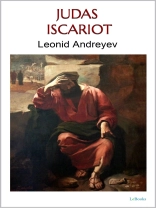Leonid Andreyev is widely considered one of the most talented writers in Russian literature. In his prose, he reflected the influence of A. Chekhov's realism, the fascination with psychological paradoxes of F. Dostoevsky, and a constant obsession with the insignificance of life and the inevitability of death, in the manner of L. Tolstoy. In 'Judas Iscariot, ’ Leonid Andreyev leads us to reflect on the true role of Judas in the Passion of Christ and suggests a possible interpretation: that the betrayal perpetrated by Judas was a kind of destiny to which he could not resist. It will be up to the reader to answer this and other questions, or perhaps, be left even more in doubt after reading this small masterpiece by Leonid Andreyev.
O autorze
Leonid Nikolaevich Andreyev (Orel, 1871 – Kuokkala, 1919) was, as a narrator and playwright, one of the most prominent Russian writers of the late 19th and early 20th centuries. Trained in Law (1897) in Moscow, he moved into the literary field just as Gorky’s success was emerging and, despite their personal friendship, became Gorky’s most qualified rival, remaining for some time in a strange balance between the two predominant currents: realism, of which Gorky was the greatest exponent, and the more complex and confusing symbolism.












